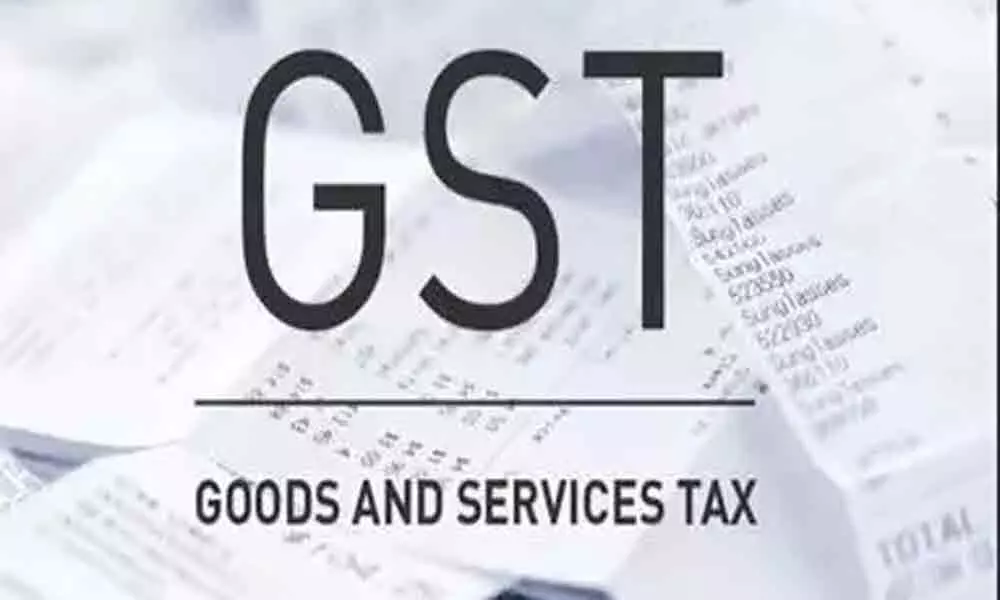Live
- How to Use Meta AI on WhatsApp for Creative Interactions
- FIIs remain net investors in India this year amid robust economy, resilient market
- Telangana government grants extended timings for pubs and parties on the eve
- Beed sarpanch murder: Kin, Maha Oppn parties, social groups take out silent march
- UAE Tops Global Mobile Internet Speeds; India Ranks 25th Worldwide
- Over one third Americans take on debt in holiday spending: Survey
- Climate change risks impacting financial system, need India-specific data: RBI’s Rajeshwar Rao
- Nitish Kumar Reddy is a star of Indian cricket, says Sunil Gavaskar
- Winter Hydration Made Easy: 5 Essential Tips to Stay Healthy
- 19 Pakistani soldiers, 3 Afghan civilians killed in clashes between Afghan-Pak border forces
Just In

With this, Mobile Phones will attract an 18 percent goods and services tax (GST) rate instead of 12 percent.
The GST Council in its 39th meeting held on Saturday, March 14, 2020, decided to raise the Goods and Services Tax on mobile phones and specified parts to 18 percent from 12 percent as the after the Council corrected the inverted duty structure that was being faced by the industry.
With this, Mobile Phones will attract an 18 percent goods and services tax (GST) rate instead of 12 percent.
The meeting held in New Delhi was chaired by Union FM Nirmala Sitharaman. The finance minister said the decision was taken to correct an inversion problem that the rate fitment committee was asked to look into. The issue was related to the refunds that are being paid were more than the taxes that were being collected on these items.
Ms. Sitharaman said, there are other items, like fertilizers, manmade yarn, fiber and footwear among others, where such problems exist but the council today corrected only the rate on mobile phones. She said the council will think of rationalizing rates of other such items in subsequent meetings if there is a need.
A massive relief was granted on maintenance, repair and overhaul service providers in India. GST rate on the sector has been lowered to 5 percent from 18 percent, at present, with a provision of availing full input tax credit (ITC).
There were states like West Bengal had cautioned against increasing the tax rate on some products at least when the economic situation is weak and the country is facing the impact of the coronavirus outbreak.
Key Highlights of the 39th GST Council Meet
The council has rationalized GST on match sticks and now they will attract 12 percent GST and this will be effective from April 1, 2020. Earlier, the handmade matchsticks were attracting 5 percent while the machine-made were being charged at 18 percent.
There was a retrospective change to GST law for interest charged on late payment.
The deadline for GSTR-9C filing for small businesses was relaxed.
It extended the date for filing the annual return and reconciliation statement for FY19.
E-invoicing and QR code applicability deferred to October 1, 2020.
Present returns in GSTR-1 & FORM GSTR-3B to continue till September 2020 and the new returns likely to be regulated from October 1, 2020.
Filing of GSTR-9C for FY 2018-19 to be waived off for businesses, MSMEs, with turnover less than Rs 5 crore aggregate turnover.
The due date for filing GSTR-9 annual return and GSTR-9C reconciliation statement for FY 2018-19 will be extended to June 30, 2020, for those with turnover less than R 5 crore.
No late fee to be charged for delayed filing of GSTR-9 for those with less than Rs 2 crore aggregate turn over in FY 2017-18 and FY 2018-19.
A new 'know your supplier' to be introduced so that every business can get detailed information on every supplier.
Interest for delay in payment of GST will be calculated on net GST liability, effective from July 1, 2017. The law will be amended for this retrospectively.
GSTR-1 for 2019-20 to be waived for certain taxpayers who were not able to opt for the special composition scheme by filing FORM CMP-02.
Time for finalising the e-Wallet scheme has been set up to March 31, 2021.
Besides, the Council has asked Infosys to work out solutions for overhauling the GST Network by July 2020, instead of time till January 2021, which was sought by Infosys chief Nandan Nilekani. Nilekani suggested bringing a roadmap for a new simplified GST Returns by January 2021. Some changes expected in the new returns process.
Ms Sitharaman said Nilekani will also be present for the next three GST Council meetings to apprise the Council on measures taken and their impact on the overhauling.
She added a legal opinion will be taken on whether the Council can borrow and who will be the guarantor, for giving compensation to states, given the low revenue generator that was impacting cess collections. Finance Minister said that Rs 78,000 crore has been collected as compensation cess, while the total compensation released to states is over Rs 1.2 lakh crore.
A special meeting of the Council will be called within two weeks after the Parliament session ends.

© 2024 Hyderabad Media House Limited/The Hans India. All rights reserved. Powered by hocalwire.com







